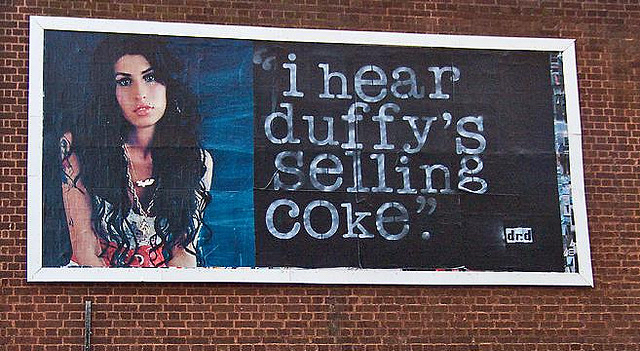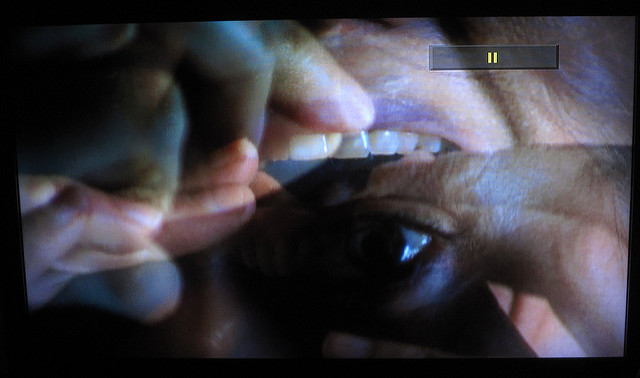Asif Kapadia’s documentary Amy, about the singer Amy Winehouse, is suitably gutting. How could it not? Hers is a tragic story of a vibrant young woman with extraordinary talent whose life is cut short by drugs, alcohol, and an eating disorder. It is also, Kapadia takes care to show, the story of a girl surrounded by thousands, all who wanted a piece of her until, bit by bit, she disappeared.
A promoter turned manager gestures to the self-interest of those who were to care for her. Blake Fields, the boyfriend-husband who turned her onto crack and heroin—as if their relationship weren’t compulsively damaging enough—dumps her, but shows up again when her career takes off. (His wardrobe is hilariously on the nose as villain with popped collars, fedoras, and scarves galore; if a fiction film, this costuming would have been declared too much.) And Mitchell Winehouse dominates, with the typical stage parent narrative: That person who was all but absent during Amy Winehouse’s childhood, but who showed up later on to manage (or rather feast on) her career.
The footage from the documentary, Amy: The Untold Story supplies not only many images and interviews, but exists as condemnation of this scavenger parent and the media that comply. Indeed, this film exists thanks to the amazing amount of footage of Amy, from mobile phone video to paparazzi invasions, to coverage of her concerts. This alone is damning enough: She was subject to a constant gaze.
This attention is hardly surprising. Amy Winehouse had a stunning voice and a charisma that makes much of the early footage a joy to watch. An eye-roll, simultaneously playful and scornful makes short work of idiotic interview questions. Her adoration of jazz gives her the enthusiast’s edge; it is infectious. Meanwhile, her commitment to writing her own songs lest she become an empty pop idol results in the most personal work writ and sung large. Very large.
So how is it that this figures almost too little in the documentary? One can see the rationale. This larger than life voice was cut short, was eroded by addiction and disease. A film that gives us glimpses of this only to take it away for the last third or so creates a powerful narrative of loss even before this slow death scene finds an end. But at the same time, this is wrong. It is wrong that the film is not about Winehouse, really, but about how everyone saw her and made use of her. Her best girl friends may be the only ones truly exempt from this charge, as theirs is a story of loss and love.
Yasin bey (aka Mos Def) emerges as one of the few industry people, alongside Tony Bennett, who relate to her almost purely through music. However, almost all those receiving the most interview attention seem to tell a story of Amy Winehouse as a projection of their own desire. Even Nicky Shymansky, a longtime friend and onetime manager describes her in a way that lets slips his unrequited love for her. She could make one feel the best or the worst, he says. This description transforms her into someone who exists only in relation to others. And this is how it is in so many descriptions: Winehouse is a projection of fantasies and nightmares. This is puzzling given that this dynamic person would likely have been so much more.
But actually, it’s not puzzling at all. This is a film about the consumption of Amy. And whether Kapadia acknowledges it or not, the film is a performance of this consumption. Kapadia takes to task the machine that consumes performers until they can give no more, but he, too, is involved in the economy he indicts. The copious footage is his for the using, and for the manipulation. Video is slowed down, and Amy Winehouse captured in grotesque poses to illustrate the damage of addiction. The Ken Burns pan and scan of photographs repeatedly lingers on the belly, breasts, thighs and bottom of the young woman, making Kapadia’s gaze no different than that of Terry Richardson, who photographs Winehouse as Blake fondles (and exposes) her bottom.
Some might be tempted to describe her bulimia as part of her unruliness, much like her addiction. But this is in fact the neoliberal subject in excess. The zaftig North London Jewish girl uses her special diet to develop the industry appropriate skinniness that is so desired and adulated. Some might declare this a tortured artist who wanted to disappear, but the sheer amount of attention suggests otherwise: To disappear or to be as small as possible is how to be loved, seen, and accepted, in the industry and by the men around her.
As much as eating disorders and addictions are, in part, a matter of an individual, each moment in this film reveals how the industry benefits from this ill health. This is not a story of tormented individual genius, but how genius becomes tormented, used, and abused in a system of relentless consumption—in this case the twinned economies of the patriarchy and capitalism. Multiple moments in Amy make this ravenous Siamese beast visible, but perhaps none so much as her father suggesting she not go to rehab (or to any kind of rest) because there are “contractual obligations” to fulfill.
This is a woman who could produce music, but when not doing so according to the timetable and work-demands of the industry, was seen as fallow, a shirker, if not completely rebellious. The jokes Jay Leno makes at her expense are cruel, but may also offer insight into the anxieties of a business that is relentless and demands relentless effort. Pity the person who cannot or will not keep up.
Amy is compelling and tragic for its indictment of the self-interested people—mostly men— who surround Winehouse and the self-interested industries—media and music—that benefit from this feasting upon her. But it stumbles as it refuses a necessary reflexive and self-aware gaze.
Kapadia benefits from all this footage, including the hideous paparazzi images that plagued Amy even during the most innocuous moments. He uses the narratives constructed by those surrounding and benefiting from her. He puts all of this to use to serve his narrative, his pleasure, and his place in a film industry. Kapadia rightly wags his finger at music, news and entertainment media, and the men in Amy Winehouse’s life, but he neglects to put himself in his own line of sight.
Self-consciousness would help mitigate some of what’s on screen, which is, no matter what, a damning indictment of patriarchy and capitalism, and offers, at many points, hints of a true force of nature.
Photograph courtesy of Chris Beckett. Published under a Creative Commons license.





